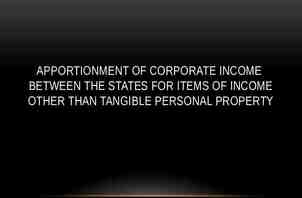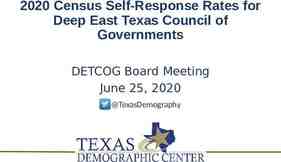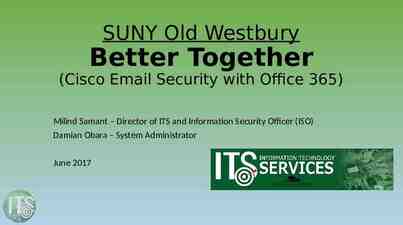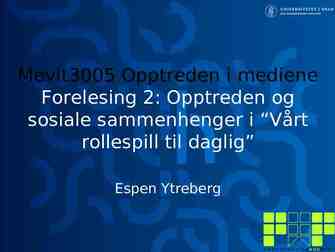Digital Equity Forum At-Large Meeting April 7, 2022 1
31 Slides206.56 KB

Digital Equity Forum At-Large Meeting April 7, 2022 1

Today’s Agenda 1. Welcome and acknowledgements 2. How to participate on Zoom or by telephone 3. Public comment 4. Introductions 5. Project updates – accessibility and language access 6. Break 7. Project updates – community listening sessions 8. Proposed consensus decision-making model 9. Break 10.Mission, vision and values 11.Recommendations development framework - introduction 12.Next steps 13.Closing remarks and adjournment 2

Meeting Goals Update attendees on project progress since the last Forum meeting (12/09/2021). Adopt a consensus-based decision-making model. Introduce revised draft of Mission, Vision, Values based on February and March small group workshop feedback. Introduce ideas for a recommendations development framework. Provide clarity on the next steps in the project and the role of Forum members and the public. 3

Welcome and Acknowledgments Dr. Karen A. Johnson, Co-chair, Director, Washington State Office of Equity (she/her/Beloved) Ernie Rasmussen, Co-chair, Digital Equity Manager, Washington State Broadband Office (he/him) 4

How to Participate in Today’s Meeting To ensure everyone’s voice is heard today: Please use the “raise hand” tool in Zoom if you would like to speak. Our moderators will recognize you. We will pause and open the floor to participants joining by telephone and ASL users to provide comments. A diversity of opinions and voices is encouraged. Please allow others to speak without interruption. Please focus on your own experiences and do not speak for others unless they have given you permission. 5

Public Comment 6

Introductions Sean Ardussi (he/him), Washington State Broadband Office 7

Project Updates: Accessibility and Language Access Carolyn Cole (she/her), Washington State Office of Equity 8

Meeting Break 9

Community Agreements Listen with curiosity and willingness to learn. Do what you need to show up fully. Resist the desire to interrupt. Speak from your own story and use “I” statements. Avoid speaking for another individual or group. Be open to the wisdom in each person’s story. Not everything will be comfortable to discuss. Prioritize impact over intent. Listen. Reflect. Apologize. Do better. Recognize, respect, adapt, and be inclusive to our differences in technology access, comforts, and communication practices. Honor accessible meeting practices. 10

Project Updates: Community Listening Sessions Anthony Campbell (he/him), Consultant, The Athena Group Overview Community listening sessions were held on March 29 (5:00 – 6:30 PM) and March 30 (Noon – 1:30 PM). Created spaces that were both accessible and calm. Approximately 60 individuals attended. Today Provide a window into what we heard during the first two listening sessions, along with some emerging themes. 11

Project Updates: Community Listening Sessions Question 1 - Have you experienced anything that kept you from feeling connected to the internet? If yes, what are the challenges? Lack of fast and reliable internet connections. Lack of internet service provider options, regardless of price. Internet service options that are not affordable. 12

Project Updates: Community Listening Sessions Question 2 - What do you need to be able to use the internet for your personal life? Needs Faster and more reliable connection Good equipment, especially Wi-Fi routers with broad coverage. Training More recognition and respect for the visually impaired. To be able to rely solely on home internet connection. Uses Streaming entertainment 21st century civic participation Accessing government services. Telehealth 13

Project Updates: Community Listening Sessions Question 3 - What do you need to be able to use the internet for your job? Needs Consistent and fast internet connection Higher quality equipment Quick service restoration when there are outages Symmetrical speeds Dynamics Employers' expectations are changing. Slow and unreliable internet access can hurt opportunities for promotions, securing employment, and having the option to work from home. 14

Project Updates: Community Listening Sessions Question 4 - What would help you feel more supported in your need for using the internet? Government action/intervention More competition More awareness about the impacts of digital inequity Accessibility enhancements Living in a state where everyone can be proud of the level of digital equity. 15

Project Updates: Community Listening Sessions Additional Insights Possible Interventions Basic Minimum Service requirements Allow local/municipal networks, such as the Anacortes Fiber Network Increase digital literacy “Apply pressure to providers to prioritize people over profits.” Sentiments The internet is not truly public. Pursuing digital equity will have a positive economic benefit in multiple ways. Diverse community dynamics must be recognized. Feelings of hopelessness because providers are perceived as having all the power. 16

Project Updates: Community Listening Sessions Emerging Themes Lack of fast and reliable internet connections. There is a need for digital literacy efforts that are designed with recognition for the diversity of those in need. Not solely an affordability issue nor just a rural issue. Accessibility needs to be more of a priority. ISPs perceived as having very few checks on their power. Working from home has changed people’s needs and expectations of what they are purchasing from an ISP. Increasing recognition that digital equity is a quality-of-life issue, which draws comparisons to rural electrification and highway extension projects. 17

Project Updates: Community Listening Sessions Questions & Reactions 18

Consensus Decision-Making Process The proposed decision-making process for the Digital Equity Forum is called consensus, and it works something like this: Proposed recommendations or ideas are passed around and the pros and cons are discussed. As a result of the discussion – the more input, the better – the idea is often modified. If a general agreement seems to be emerging, test for consensus by restating the latest version of the idea or recommendation to see if everybody agrees. If anyone disagrees, we return to the discussion to see if we can modify the idea further to make it acceptable to everyone. Everyone works together towards “yes,” even if it's not your favorite recommendation or choice. 19

Meeting Break 20

Digital Equity Forum: Mission, Vision, and Values Mission: Why we exist and who we aim to serve Vision: When the mission is successful, what does the world look like? Values: What values are important to us as we journey towards the vision? 21

Digital Equity Forum: Mission, Vision, and Values What We Heard Individuals and organizations have been working on this exact topic (digital equity) for decades. Digital literacy is missing. Consider not using “historically ” Consider inclusion of the term “outreach.” 22

Digital Equity Forum: Mission, Vision, and Values Mission (draft) The mission of the Digital Equity Forum is to make policy recommendations for the Washington state Legislature to consider that will advance digital connectivity for unserved and underserved communities, including historically disadvantaged communities throughout the state. Mission (revised) The mission of the Digital Equity Forum is to make policy recommendations for the Washington state Legislature to consider that will allow all communities the digital connectivity required for full civic and cultural participation, employment, lifelong learning, and access to essential services. 23

Digital Equity Forum: Mission, Vision, and Values What We Heard Internet as a commons Something bolder – This is for all of us, It belongs to all of us, Focus on equity, Centering community Digital literacy Is “equitable access” the best term? We need definitions Tevin’s use of “elimination of barriers” was seconded in discussion about what is meant by “equitable access” 24

Digital Equity Forum: Mission, Vision, and Values Vision (draft) All Washington state residents have equitable access to broadband internet and technology, as well as the digital tools and skills to use them effectively. Vision (revised) All Washington state communities will have equitable access to broadband internet technology as well as the tools and skills needed to participate in our digital society before 2028. 25

Digital Equity Forum: Mission, Vision, and Values What We Heard Should we have more specificity? ISPs hold all the power – does that need to be acknowledged? Do the target groups need to be more expansive? Can value 3 be expanded? Suggestion to remove “historically been and currently are” from the first value. Need to connect to current and ongoing efforts to address digital equity. Please do not use the term “marginalized.” Too focused on access? Does usability or literacy need to be included as a value? 26

Digital Equity Forum: Mission, Vision, and Values Values (draft) Equity is not equality. Equity requires developing, strengthening, and supporting policies and procedures that distribute and prioritize resources to people in identify groups who have historically been and currently are marginalized, including tribes Equity requires the elimination of systemic barriers that have been deeply entrenched in systems of inequality and oppression; and Equity achieves procedural and outcome fairness, promoting dignity, honor, and respect for all people. 27
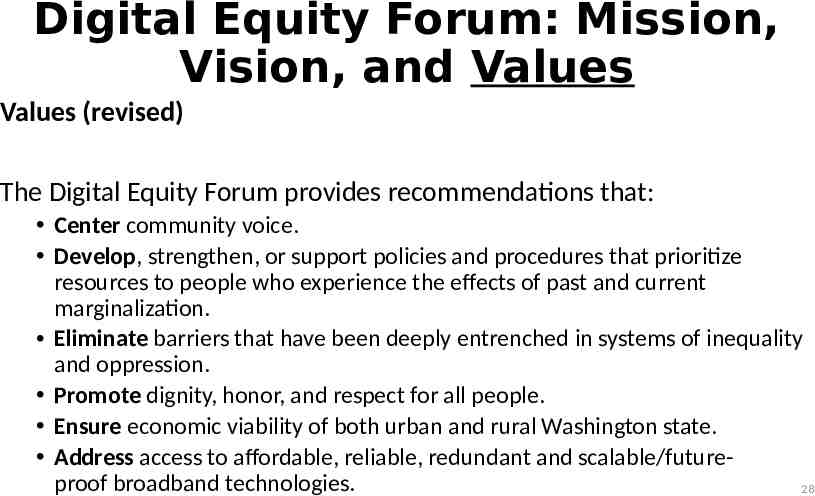
Digital Equity Forum: Mission, Vision, and Values Values (revised) The Digital Equity Forum provides recommendations that: Center community voice. Develop, strengthen, or support policies and procedures that prioritize resources to people who experience the effects of past and current marginalization. Eliminate barriers that have been deeply entrenched in systems of inequality and oppression. Promote dignity, honor, and respect for all people. Ensure economic viability of both urban and rural Washington state. Address access to affordable, reliable, redundant and scalable/futureproof broadband technologies. 28

Recommendations Development Framework How We Could Use Our Values to Create a Values-Based Recommendations Development Framework Does this recommendation: Center community voice? Develop, strengthen, or support policies and procedures that prioritize resources to people who experience the effects of past and current marginalization? Eliminate barriers that have been deeply entrenched in systems of inequality and oppression? Promote dignity, honor, and respect for all people? Ensure economic viability of both urban and rural Washington state? Address access to affordable, reliable, redundant and scalable/futureproof broadband technologies? 29

Next Steps Carolyn Cole, Washington State Office of Equity Sean Ardussi, Washington State Broadband Office The next community listening sessions will be held on May 10 (5:00 – 6:30 pm) and May 11 (12:00 noon – 1:30 pm). We will provide more information about those two listening sessions. Please help us make community members aware of these two sessions. We will provide more information about our community survey. Please help us share the survey with community members. Next At-Large Forum Meeting: June 9, 1:00 – 4:00 pm. 30
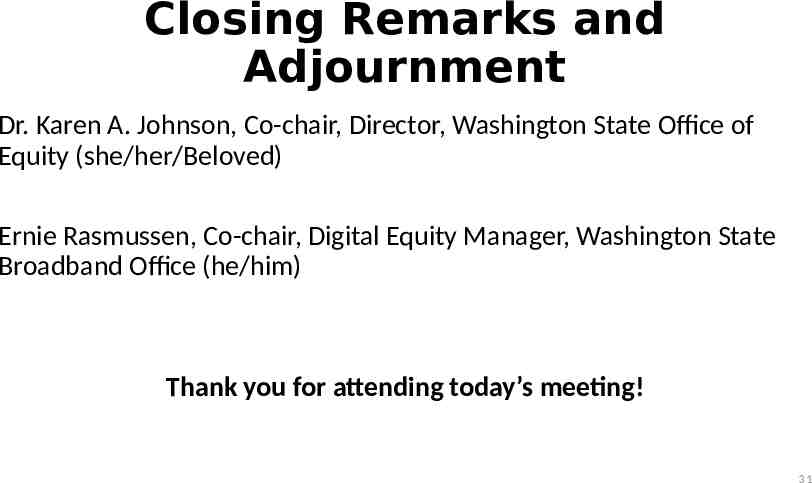
Closing Remarks and Adjournment Dr. Karen A. Johnson, Co-chair, Director, Washington State Office of Equity (she/her/Beloved) Ernie Rasmussen, Co-chair, Digital Equity Manager, Washington State Broadband Office (he/him) Thank you for attending today’s meeting! 31

